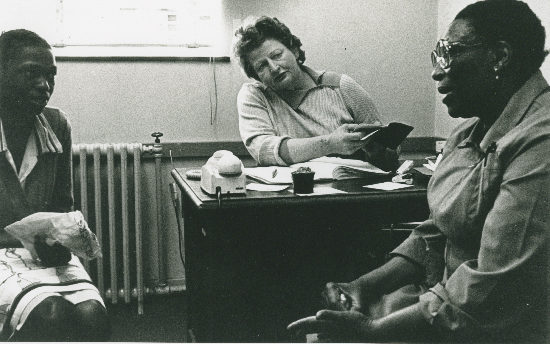"White is a colour of the skin... that has nothing to do with the colour of your soul."
- Sheena Duncan, Interview with Julie Frederikse, p. 24, AL2460_A4.7 :: Sheena Duncan, Julie Frederikse Collection
It is with deep respect that the South African History Archive remembers veteran South African human rights activist Sheena Duncan, who passed away peacefully in the early hours of the morning on Tuesday the 4th of May, 2010. Her life's work, values and leadership influenced the lives of millions of South Africans, transcending ingrained race and class divides. Duncan was exposed early on to the ills of the apartheid system, and her mother, Jean Sinclair, was a founding member of the Black Sash in 1955. For Duncan, the moral implications of racial segregation could not be ignored: she spoke out from within the insular white South African community during a time when "most white people (could not) conceive the truth about black life." For her, this was a "very dangerous thing." Through her humanitarian work, Duncan worked tirelessly in support of those affected by apartheid legislation. Between the 1970s and 1980s, Duncan served two terms as the National Chairperson of the Black Sash. In a 1985 Black Sash report, Duncan‘s value to the organisation was emphasized:
"[Duncan] has a broad political perspective combined with an extraordinary knowledge of relevant facts. She has a penetrating mind that unerringly gets to the root of a problem and almost immediately finds a solution for it."
- Black Sash National Conference Papers, 1986 Conference, 13-16 March, Durban, AL3117_A1.3, The Laura Pollecutt Collection
Duncan on the right to conscience
Duncan was resolute on the need for white South Africans to oppose a legal system which implicated them, particularly from the 1970s, in its iniquity. She wrote widely on issues of civil disobedience, arguing that the need for such methods arose...
"...from the conflict of conscience when laws violate justice and which cannot in conscience be obeyed. The South African statute books abound with laws of this kind... the very structure of apartheid is an offence to human rights and therefore presents a challenge to conscience."
- Sheena Duncan, ‘Some thoughts on breaking the law', Upfront, AL2460_A4.7 (news clipping):: Julie Frederikse Collection
With the advent of the Defence Amendment Act of 1983, overwhelming restrictions against conscientious objection and civil disobedience were enforced. At the 1983 Black Sash national conference, Duncan famously pointed out that, although it was illegal under new regulations to incite someone against the war, it was not illegal to call for an end to conscription. This helped mobilise the South African anti-conscription movement - and the establishment of the End Conscription Campaign.
Duncan is survived by her two daughters, her grandchildren, and a generation of activists and comrades whose lives have been enriched by her example. Over the course of May, three memorial services were held in her honour, including one at the Regina Mundi Church in Soweto on Sunday 16 May, 2010.
SAHA collections with material on Sheena Duncan
AL3065 :: The Brian Currin Collection
The collection was established by Brian Currin, head of the National Directorate of Lawyers for Human Rights (LHR) between 1987 and 1994. The collection contains a 1992 conference address by Sheena Duncan to the Black Sash entitled 'Outside the walls.'
AL2460 :: Julie Frederikse Collection
The Julie Frederikse collection consists of audiotapes, CDs and transcripts of oral interviews she and other people conducted between 1979 and 1990 as part of the research conducted for Frederikse's 1986 book "South Africa: A Different kind of War: from Soweto to Pretoria." Sheena Duncan's interview is accompanied with a range of news clippings related to Duncan, and often written by her.
AL3117 :: Laura Pollecutt Collection - Black Sash Papers
Laura Pollecutt's papers reflect her political activism, which first started with her involvement in the Progressive Party. She later became a prominent member of the Southern Transvaal branch of the Black Sash, participating in numerous alliances and campaigns. Her papers related to the Black Sash provide close documentation on the work of Black Sash patron, Sheena Duncan.

Sheena Duncan in the Johannesburg office of the Black Sash, AL2547_17.2.2, SAHA Original Photograph Collection








